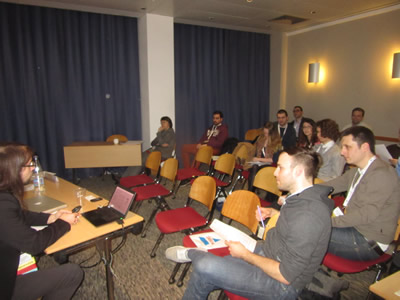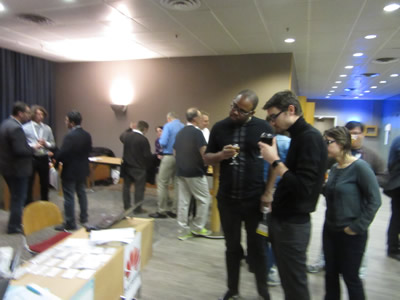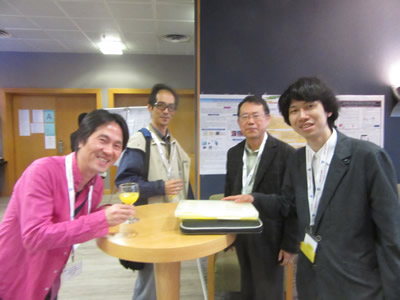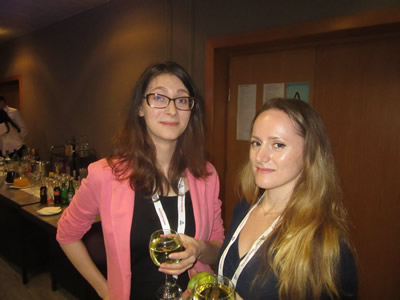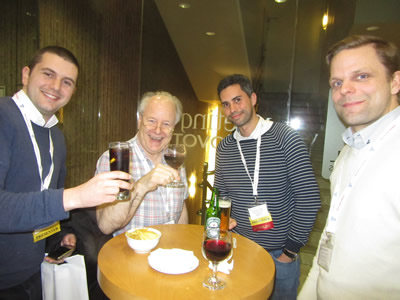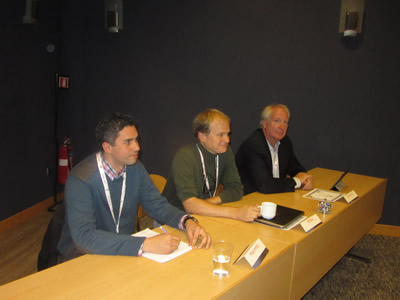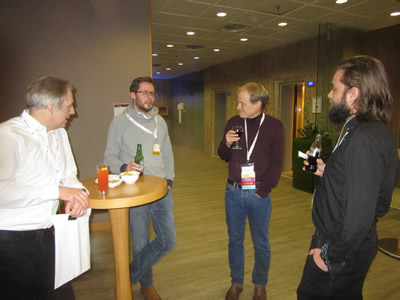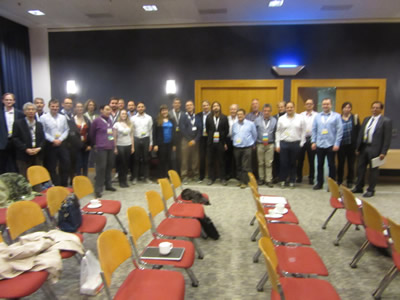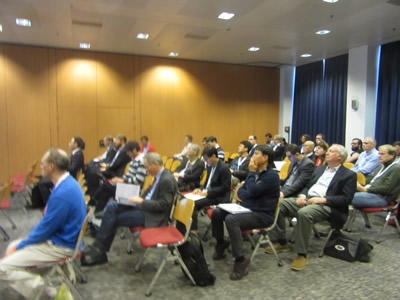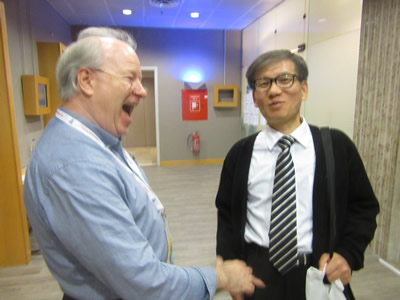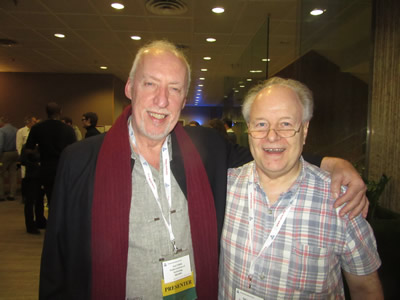SOFTNETWORKING 2018 - The International Symposium on Advances in Software Defined Networking and Network Functions Virtualization
April 22, 2018 - April 26, 2018
SOFTNETWORKING 2018 (hosted with ICN 2018): Call for Papers
The Symposium is dedicated tadvances and challenges in SDN&NFV technologies and their applications.
Software-Defined Networking (SDN) is a recent architectural and technological approach that decouples the network control and data planes. It separates the network control logic from the underlying routers and switches by logically centralizing the network control in SDN controllers and implementing the traffic forwarding in switching hardware. SDN offers network programmability capabilities, applicable in a flexible way. SDN introduces novel abstractions in networking, thus simplifying network management and facilitating faster network evolution. SDN is natively based on virtualization. Via service orchestration, the applications can automatically reconfigure the network and simultaneously optimize the user experience, application performance and network resource utilization.
Network Function Virtualization NFV is an emergent technology promoted recently (mainly by the telecom world), having as major objective timprove the capital efficiencies vs. traditional dedicated HW implementation solutions, by using COTS HW, tprovide Virtualized Network Functions (VNFs) through SW virtualization techniques. Among its specific objectives are: sharing of HW and reducing the number of different HW architectures; timprove flexibility in assigning VNFs tHW (better scalability, decoupling functionality from location, enabling time of day reuse, enhancing resilience through virtualization, and facilitating resource sharing); rapid service innovation through SW-based service deployment; common automation and operating procedures; reduced power usage; standardized and open I/Fs between VNFs infrastructure and management entities.
SDN approach can support or is applicable in various contexts: clouds/data centres; enterprise; WANs, cellular/mobile, wireless, home, sensors – networks; network and resources management, security; traffic and QoS management, media and content distribution. New areas of applications have targets in M2M, wireless and 5G networks. The 5G core network will most proba¬bly utilize the ongoing evolution in SDN and NFV tprovide a high level of flex¬ibility and scalability when supporting different 5G deployments with a com¬mon toolbox of network functions. While still in early stage, SDN is moving very fast towards its adoption in the industry and by the operators, but it still has open research issues.
NFV applications and use cases are oriented towards several areas (but not only): Home environment; Mobile Core&IMS; Mobile base stations; Fixed access networks; CDNs; flexible service offering through NFVIaaS, VNFaaS, VNPaaS, VNF flexible Forwarding Graphs.
SDN and NFV could be implemented independently; however, they are more and more seen as complementary technologies that can cooperate in complex systems. This open research issue is an important topic of the symposium.
We solicit both academic, research, and industrial contributions. We welcome technical papers presenting research and practical results, position papers addressing the pros and cons of specific proposals, such as those being discussed in the standard fora or in industry consortia, survey papers addressing the key problems and solutions on any of the above topics short papers on work in progress, and panel proposals.
Industrial presentations are not subject to the format and content constraints of regular submissions. We expect short and long presentations that express industrial position and status.
Tutorials on specific related topics and panels on challenging areas are encouraged.
The topics suggested by the conference can be discussed in term of concepts, state of the art, research, standards, implementations, running experiments, applications, and industrial case studies. Authors are invited to submit complete unpublished papers, which are not under review in any other conference or journal in the following, but not limited to, topic areas.
All topics and submission formats are open to both research and industry contributions.
SOFTNETWORKING 2018 tracks:
- Software Defined Networking (SDN): concepts, challenges and architectures
- Control and Management in SDN; Network Operating Systems (NOS, ONOS) and virtualization in SDNs
- Network Function Virtualization concepts, challenges and architectures (NFV, OPNFV)
- SDN and NFV cooperation
- SDN and NFV standardization
- OpenDaylight (goals, platforms, interfaces and applications), OpenStack and SDN
- SDN Controllers design and implementation
- SDN Forwarding Elements design and implementation
- OpenFlow and Southbound Protocols
- Application programming interfaces for SDN
- Forwarding plane abstractions, programmability, languages
- Verification techniques and tools for SDN and NFV
- Performance evaluation, optimization and isolation of the Data and Control Planes
- SDN applications and use cases:
- Data-center/ clouds/ BigData
- Service Provider Networks: dynamic service chaining, optical networks and transport, cellular/mobile, traffic management, resources and QoS management, WANs/carrier networks and support for clouds, virtualization of aggregation networks
- Enterprise, home, sensors networks
- Software Defined Wireless Networks (SDWN)
- SDN in mobile and 5G networks
- SDN controlled vehicular networks
- Internet of Things (IoT) and M2M communications
- NFV applications and use cases
- Home environment
- Mobile Core&IMS, mobile base stations
- Fixed access networks
- CDNs
- NFVIaaS, VNFaaS, VNPaaS, VNF Forwarding Graphs
- Reliability, resiliency and fault management in SDN and NFV
- Security and privacy and in SDN and NFV
- Data and Control Plane scalability, inter-operability
- Autonomic (self) management technologies in SDN and NFV
- SDN/NFV architecture versus Content delivery and oriented networks, Information Centric Networking
- Operators and Service Providers business and deployment perspective on SDN and NFV
- Planning and Deployment of SDN/NFV technologies and applications in operational networks
Deadlines:
Submission | Jan 17, 2018 |
Notification | Feb 26, 2018 |
Registration | Mar 12, 2018 |
Camera ready | Mar 17, 2018 |
Deadlines differ for special tracks. Please consult the conference home page for special tracks Call for Papers (if any).
INSTRUCTION FOR THE AUTHORS
Authors of selected papers will be invited to submit extended versions to one of the IARIA Journals.
Publisher: XPS (Xpert Publishing Services)
Archived: ThinkMindTM Digital Library (free access)
Prints available at Curran Associates, Inc.
How to submit to appropriate indexes.
Only .pdf or .doc files will be accepted for paper submission. All received submissions will be acknowledged via an automated system.
Contribution types
- regular papers [in the proceedings, digital library]
- short papers (work in progress) [in the proceedings, digital library]
- ideas: two pages [in the proceedings, digital library]
- extended abstracts: two pages [in the proceedings, digital library]
- posters: two pages [in the proceedings, digital library]
- posters: slide only [slide-deck posted on www.iaria.org]
- presentations: slide only [slide-deck posted on www.iaria.org]
- demos: two pages [posted on www.iaria.org]
FORMATS
Only .pdf or .doc files will be accepted for paper submission. All received submissions will be acknowledged via an automated system.
Final author manuscripts will be 8.5" x 11", not exceeding 6 pages; max 4 extra pages allowed at additional cost.
Helpful information for paper formatting for MS Word can be found here.
There is a community provided LaTeX template: the CTAN package iaria (with full IARIA formatting rules, including IARIA citation style, but for providing citation style it is tightly bound to pdflatex+biblatex+biber). In addition, there is also iaria-lite (not bound to pdflatex+biblatex+biber, but compatible with any TeX stack; thus, it cannot provide the IARIA citation formattings, but only the titlepage and content-related IARIA formatting rules). Based on the iaria package, there is a minimal working example as Overleaf template. When you are using the LaTeX templates, please still adhere to the additional editorial rules.
Slides-based contributions can use the corporate/university format and style.
Your paper should also comply with the additional editorial rules.
Once you receive the notification of contribution acceptance, you will be provided by the publisher an online author kit with all the steps an author needs to follow to submit the final version. The author kits URL will be included in the letter of acceptance.
We would recommend that you should not use too many extra pages, even if you can afford the extra fees. No more than 2 contributions per event are recommended, as each contribution must be separately registered and paid for. At least one author of each accepted paper must register to ensure that the paper will be included in the conference proceedings and in the digital library, or posted on the www.iaria.org (for slide-based contributions).
CONTRIBUTION TYPE
Regular Papers (up to 6-10 page article -6 pages covered the by regular registration; max 4 extra pages allowed at additional cost- ) (oral presentation)
These contributions could be academic or industrial research, survey, white, implementation-oriented, architecture-oriented, white papers, etc. They will be included in the proceedings, posted in the free-access ThinkMind digital library and sent for indexing. Please submit the contributions following the instructions for the regular submissions using the "Submit a Paper" button and selecting the appropriate contribution type. 12-14 presentation slides are suggested.
Short papers (work in progress) (up to 4 pages long) (oral presentation)
Work-in-progress contributions are welcome. These contributions represent partial achievements of longer-term projects. They could be academic or industrial research, survey, white, implementation-oriented, architecture-oriented, white papers, etc. Please submit the contributions following the instructions for the regular submissions using the "Submit a Paper" button and selecting the contribution type as work in progress. Contributors must follow the conference deadlines, describing early research and novel skeleton ideas in the areas of the conference topics. The work will be published in the conference proceedings, posted in the free-access ThinkMind digital library and sent for indexing. For more details, see the Work in Progress explanation page. 12-14 presentation slides are suggested.
Ideas contributions (2 pages long) (oral presentation)
This category is dedicated to new ideas in their very early stage. Idea contributions are expression of yet to be developed approaches, with pros/cons, not yet consolidated. Ideas contributions are intended for a debate and audience feedback. Please submit the contributions following the instructions for the regular submissions using the "Submit a Paper" button and selecting the contribution type as Idea. Contributors must follow the conference deadlines, describing early research and novel skeleton ideas in the areas of the conference topics. The work will be published in the conference proceedings, posted in the free-access ThinkMind digital library and sent for indexing. For more details, see the Ideas explanation page. 12-14 presentation slides are suggested.
Extended abstracts (2 pages long) (oral presentation)
Extended abstracts summarize a long potential publication with noticeable results. It is intended for sharing yet to be written, or further on intended for a journal publication. Please submit the contributions following the instructions for the regular submissions using the "Submit a Paper" button and selecting the contribution type as Extended abstract. Contributors must follow the conference deadlines, describing early research and novel skeleton ideas in the areas of the conference topics. The work will be published in the conference proceedings, posted in the free-access ThinkMind digital library and sent for indexing. 12-14 presentation slides are suggested.
Posters (paper-based, two pages long) (oral presentation)
Posters are intended for ongoing research projects, concrete realizations, or industrial applications/projects presentations. The poster may be presented during sessions reserved for posters, or mixed with presentation of articles of similar topic. A two-page paper summarizes a presentation intended to be a POSTER. This allows an author to summarize a series of results and expose them via a big number of figures, graphics and tables. Please submit the contributions following the instructions for the regular submissions using the "Submit a Paper" button and selecting the contribution type as Poster Two Pages. Contributors must follow the conference deadlines, describing early research and novel skeleton ideas in the areas of the conference topics. The work will be published in the conference proceedings, posted in the free-access ThinkMind digital library and sent for indexing. 8-10 presentation slides are suggested. Also a big Poster is suitable, used for live discussions with the attendees, in addition to the oral presentation.
Posters (slide-based, only) (oral presentation)
Posters are intended for ongoing research projects, concrete realizations, or industrial applications/projects presentations. The poster may be presented during sessions reserved for posters, or mixed with presentation of articles of similar topic. The slides must have comprehensive comments. This type of contribution only requires a 8-10 slide-deck. Please submit the contributions following the instructions for the regular submissions using the "Submit a Paper" button and selecting the contribution type as Poster (slide-only). The slide-deck will be posted, post-event, on www.iaria.org.
8-10 presentation slides are suggested. Also a big Poster is suitable, used for live discussions with the attendees, additionally to the oral presentation.
Presentations (slide-based, only) (oral presentation)
These contributions represent technical marketing/industrial/business/positioning presentations. This type of contribution only requires a 12-14 slide-deck. Please submit the contributions following the submission instructions by using the "Submit a Paper" button and selecting the contribution type as Presentation (slide-only). The slide-deck will be posted, post-event, on www.iaria.org.
12-14 presentation slides are suggested.
Demos (two pages) [posted on www.iaria.org]
Demos represent special contributions where a tool, an implementation of an application, or a freshly implemented system is presented in its alfa/beta version. It might also be intended for thsoe new application to gather the attendee opinion. A two-page summary for a demo is intended to be. It would be scheduled in special time spots, to ensure a maximum attendance from the participants. Please submit the contributions following the submission instructions by using the "Submit a Paper" button and selecting the contribution type as Demos. The Demos paper will be posted, post-event, on www.iaria.org.
Tutorial proposals
Tutorials provide overviews of current high interest topics. Proposals should be for 2-3 hour long. Proposals must contain the title, the summary of the content, and the biography of the presenter(s). The tutorial slide decks will be posted on the IARIA site.
Please send your proposals to tutorial proposal
Panel proposals
The organizers encourage scientists and industry leaders to organize dedicated panels dealing with controversial and challenging topics and paradigms. Panel moderators are asked to identify their guests and manage that their appropriate talk supports timely reach our deadlines. Moderators must specifically submit an official proposal, indicating their background, panelist names, their affiliation, the topic of the panel, as well as short biographies. The panel slide deck will be posted on the IARIA site.
Please send your proposals to panel proposal
